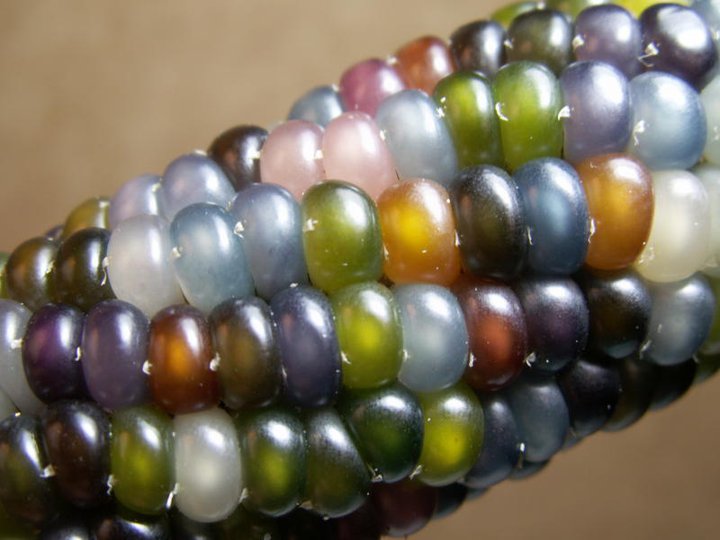The beautiful image you see is not photoshopped. It is a photo of the heirloom “Glass Gem” maize variety recently rescued by seedsperson Greg Schoen and carefully stewarded by the Seeds Trust. When I saw this photo, I was overwhelmed. This, I thought, is a glimpse into the world we have denied ourselves because of how we choose to live. This is a picture of what kind of world we could live in if we only willed it.
Disclaimer: I am not a scientist, farmer or agriculture worker (although I do have a backyard garden). I’m not going to talk about food security, permaculture or sustainable agriculture. rabble.ca has loads of great journalists and bloggers who can tell you all you need to know about those things. I study culture and society and the stories we tell ourselves about ourselves. And for me, this incredible, breathtaking cob of corn tells us a story.
National Geographic ran a story a few months back about crop diversity. It included an arresting graphic, which detailed the number of vegetable and fruit seeds commercially available in 1903 — and the number available now. A few examples: you could buy 497 varieties of lettuce in 1903; you can find 36 now. Tomatoes? Find all 79 varieties now and you’re lucky. There were 408 a century ago. If you’re looking for corn you’re limited to a dozen varieties nowadays; go back a hundred years and that number swells to an astonishing 307.
Three hundred types of corn! And those are only the ones commercially available. If you ever need proof of the wonder, the beauty the Earth offers us, you only need look at this survey of heirloom potatoes for the awkward, colourful and palatable diversities available. The paucity of russet vs. Yukon gold (both nevertheless delicious!) is striking.
It doesn’t take a PhD in agricultural science to realize why this is happening. Monocultures suit the capitalist mode of production which wants to produce the most food possible with the least quantities of financial cost and human labour. You can read all about crop giants like Monsanto and the attendant health problems, environmental risks and social costs elsewhere on rabble.ca. I promised I wouldn’t get into that (OK, I lied a little); but the truth is that this flattening of diversity endemic to capitalism manifests itself in places other than our crops: it flattens our dreams too.
Capitalism is supposed to offer us unlimited choice: I can have whatever I want when I want it. What Schoen’s gorgeous corn kernals show us, however, is that “choice” is not diversity. Why would I want to “choose” to have tepid, shrinkwrapped corn in December when I can have 300 or more kinds of corn in August? We see this dynamic play out in virtually every sphere of society: I may be able to choose which film to see on Friday night from a stock of dozens, with new movies opening every week — but when I start to realize that Chernobyl Diaries is just a watered-down Paranormal Activity 2, at what point do I need to wonder how many Batman (or Twilight or Harry Potter) sequels will be enough?
There are few, if any, repositories of diversity so breathless, so awesome, as can be found in the natural world. So even when we’ve convinced ourselves that corn comes exclusively in yellow and light-yellow, the Earth has the capacity to shock us out of our complacency with such force as Schoen’s corn impressed on me. It’s moments like this — yes, something as simple as seeing a new seed varietal — when the utopian possibilities of our world confront us with dazzling urgency.
Margaret Thatcher left us with the legacy of TINA: There Is No Alternative. But Schoen’s “Glass Gem” shows us that it simply isn’t so. The choices we make as a society actively deprive us of access to these alternate ways of being. If we can see such marvels in a single ear of corn or a misshapen tuber, what awaits us if we reimagine the way we structure economic, judicial, parliamentary and cultural policies?
Perhaps this seems naïve — it may seem like a far leap from vegetables to social practices, ethics and mores — but what if we thought of naïvité in terms of its etymological roots: un naïf, the newly born, unencumbered. Such a perspective would surely look upon the capitalist system in which we live, which limits diversity, flattens our capacity for utopia and sets inexorable limits on the human and say: no, not that. Surely, it would choose instead to embrace the possibilities of a wondrous world as complex, multicoloured and beautiful as this photo; and as simple as an ancient seed.




